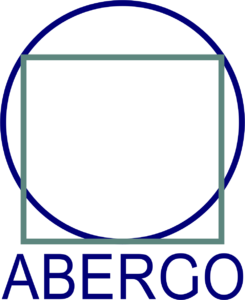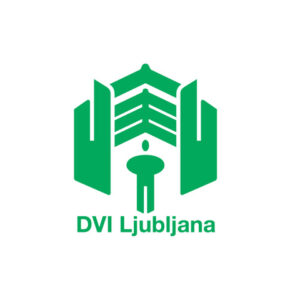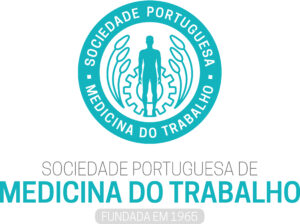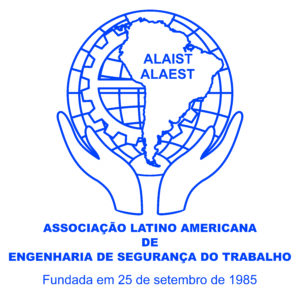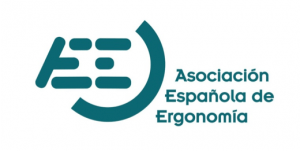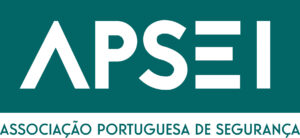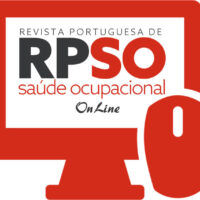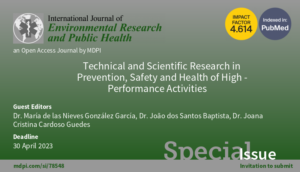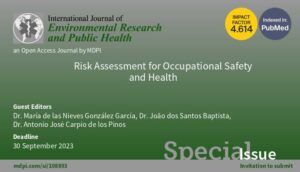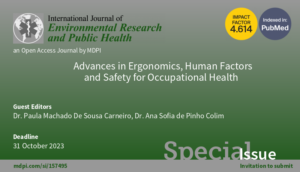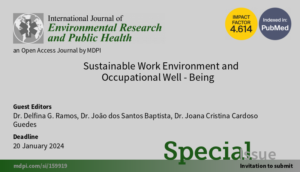20-21 July, 2023
Hybrid event
Who are we?
The Portuguese Society for Occupational Safety and Hygiene (Sociedade Portuguesa de Segurança e Higiene Ocupacionais) is a technical-scientific structure and member of ENSHPO (European Network of Safety and Health Professional Organizations) that promotes the deepening of knowledge in the areas of Safety, Hygiene, Health and Ergonomics and Environment Protection at work and, simultaneously, access to research results in these areas through the promotion of events such as the upcoming SHO2023.
About the event
SHO
This Symposium has been held annually since 2004, so SHO2023 will be its 20th edition.
The publication of a book (since 2013) with chapters indexed in SCOPUS with great international projection has increasingly attracted the presence of delegates from many countries.
Since 2019, SHO has offered technical-scientific training in the most varied areas, granting participation certification to those who register.
Participants also have the opportunity to publish their work as one of the following manuscripts types:
- Book Chapter – written in English. All works that comply with deadline submission and the rules referred to in the authors’ instructions can apply to Book Chapter. The works will be selected in two phases:
- Formal verification by the Occupational and Environmental Safety V Editors
- Scientific evaluation carried out by, at least, two members of the International Scientific Committee (ISC). Papers with an ISC average rating of 0 (or more points) on a scale from -3 to +3 points will be accepted. Unselected papers are automatically re-classified as Proceeding Articles for possible publication in the Proceedings Book.
- Proceeding Articles – written in Portuguese or English. This category includes articles selected by ISC’s decision, according to the former point, or authors’ submission option.
- Abstracts – written in English. This category includes articles selected by ISC’s decision, according to the former point, or author’s submission option. The abstracts will be considered for Poster presentation.
Last symposium in numbers:
Papers
Authors
Countries
Courses
KEYNOTE SPEAKERS
KEYNOTE SPEAKERS

Use of nanomaterials in cosmetics
(shared session)
Delfina Ramos was born in Barcelos, in 1970. She holds a PhD in Industrial and Systems Engineering from the University of Minho since 2013. Delfina Ramos is an Invited Professor at the Institute of Engineering of Porto (ISEP). She is a researcher at the Center ALGORITMI in the Industrial Engineering and Management (IEM) group of Ergonomics and Human Factors at the School of Engineering, University of Minho and a researcher at the Associate Laboratory for Energy, Transports, and Aerospace (LAETA-INEGI) at the University of Porto. She is an Auditor, Consultant, and Certified Health and Safety High Technician. Senior Professional Association of Engineers of Portugal member and a Safety Engineering Specialist, she is also a member of the National Council of the College of Chemical and Biological Engineering for the 2022-2025 mandate. Delfina Ramos is a member of CT194 (Technical Commission for the Standardization of Nanotechnologies – SC4 – Health, Safety, and Environment) of the Portuguese Quality Institute (IPQ).
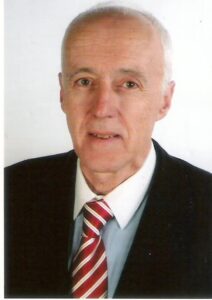
Use of nanomaterials in cosmetics
(shared session)
Luís Almeida was born in Porto in 1951. He holds a MSc Chemical Engineer from the University of Porto since 1974 and a PhD in Textile Engineering from the University of Haute Alsace (France) since 1978. From 1987 until 2022, Luís Almeida was a Full Professor at the University of Minho. At present, he is a retired professor (“jubilado”). From 1991-2000 he was Vice-General Manager of CITEVE (Technological Centre for the Textile and Clothing Industries of Portugal). His curriculum includes extensive activity in the field of textile finishing industry, environment, and quality, in terms of research, teaching and technical assistance to companies, as well as standardisation. He is the convener of Portuguese Technical Standardisation Committee for Nanotechnology.
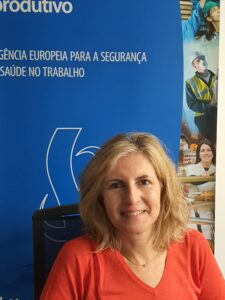
Challenges of workers' participation in the digital era
Emília Telo is the National Focal Point of the European Agency for Safety and Health at Work (EU-OSHA). Emília Telo has a Bachelor in Biochemistry from the Faculty of Science and Technology of the University of Coimbra (1991), she is an Industrial Hygienist from ITSEMAP Portugal since 1993, Master in Biomedical Engineering from the Faculty of Medicine of the University of Coimbra (1996) and holds a PhD in Hygiene, Health and Safety at Work from the University of León, in Spain, since 2010. Currently, Emília Telo is a researcher and Professor in Occupational Safety and Health (OSH), a member of national and European working groups, with several participations in National and International Congresses and several publications in the area of OSH.
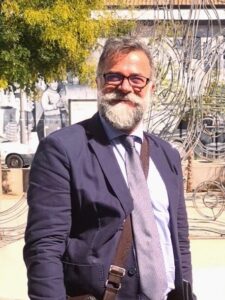
Intelligent communication in occupational risk assessment.
Antonio J. Carpio was born in Toledo (Spain) in 1969. He holds a PhD in Technological Innovation in Building at the Higher Technical School of Building (ETSEM) of the Polytechnic University of Madrid (UPM), since 2017. Antonio Carpio has a Master’s Degree in Occupational Risk Prevention (Universidad del Atlántico Medio-UNIDAM-2020), Master’s Degree in Technological Innovation for Building (UPM-ETSEM-013), Graduate in Building Engineering (Universidad de Castilla La Mancha-UCLM-2010) and Technical Architect in Execution of Works (UPM-1993). Antonio Carpio is an Assistant Professor and Researcher at the ETSEM, in the Department of Architectural Constructions and its Control. He is part of two research groups: Building and Rehabilitation Techniques of the UPM (ITRE), and Innovative Building and Rehabilitation Techniques (TIER) of the ETSEM. Since 2017, he has published several articles in JCR journals, several book chapters, and has participated in numerous international conferences, in the area of occupational risk assessment in construction sites. For 30 years he has developed his profession as a freelance covering professional fields such as designer, project manager, construction manager, appraiser, and judicial expert.
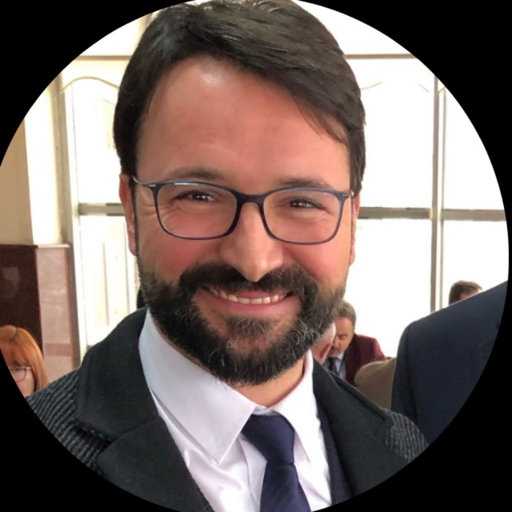
Erasmus+ Projects and Opportunities for OHS Experts: DigiRescueMe and STRIM Projects
Oktay Sahbaz is a Professor at Kutahya Dumlupinar University-Türkiye and studied at Wroclaw University of Technology-Poland during his PhD. He visited the University of Newcastle-Australia for post-doctorate research in 2016. He was a visiting professor in Kazakhstan in 2022. Dr Sahbaz is the former head of the international relations office of the DPU and is currently the head of the processing and technology division of the mining engineering department. He is also an occupational health and safety expert and consultant. Dr. Sahbaz has more than 50 international publications, including Jameson flotation cells, flotation of various minerals, and occupational health and safety issues. In addition to the above, Dr Sahbaz is one of the section editors in the Physicochemical Problems in Mineral Processing Journal. He received one of the Dedeman Mining Company Awards in 2011. Dr. Sahbaz has also been involved in many project management and networking activities in terms of international projects and EU funds. He has worked as a project writer and coordinator on 11 different international projects.
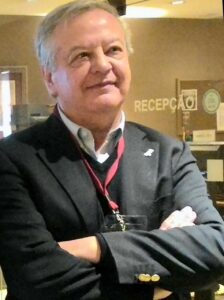
Relevance of Data in Construction Safety Prevention
Alfredo Soeiro was the Academic Director of Civil Engineering at the University of Porto and vice president of the department between 2003 and 2007. He was Pro-Rector of the University of Porto for Continuing Education between 2003 and 2005. He has been a member of the editorial board of the journal European Journal of Engineering Education since 1998. Alfredo Soeiro has been the ambassador of the European Network Education and Training in Occupational Safety and Health (ENETOSH) in Portugal since 2012, Secretary General of The Association of European Civil Engineering Faculties (AECEF) since 2017 and Vice-President of the International Safety and Health Construction Coordinators Organization (ISHCCO) since 2019. He was a member of the International Association for Continuing Engineering Education (IACEE) Council between 1995 and 2018.
COURSES
COURSES
Nilza Ramião and Pedro Pratas
Motion Capture System in Biomechanical and Ergonomic Analysis July 20
About the course
Motion capture systems can support the creation of engineering solutions for the industry, such as improving jobs and contributing to occupational health and well-being. Bearing that in mind, this workshop will address the hardware that allows the capture of human movement. The typical approach for using such software and hardware and its generic uses will be presented. The MOCAP system added to multibody software will the discussed.
About the lecturers
Nilza Ramião has a PhD in Biomedical Engineering from the Faculty of Engineering of the University of Porto (FEUP). Her main research areas include Biomechanics, biomedical Engineering, and experimental mechanics. She performs Project Management and Business Development functions at INEGI, with the objective of promoting and developing strategies with companies and supporting national and international research and R&D projects in the areas of Engineering, Biomechanics and Health Sciences. She has experience in structuring actions for internal reorganization and market analysis in companies and clinics in the health sector, as well as in the support and development of several innovation projects in the same sector, participating in more than 50 national and European projects.
Pedro Pratas has a master’s degree in Mechanical Engineering in the field of Automation. With a career in R&D, focusing on Mechanical Engineering and Biomedical Engineering, with an emphasis on biomechanics, product development, instrumentation and electronics.
Adeeb Sidani
Basics to creating virtual reality and augmented reality scenarios July 19, 20 and 21
About the course
Mining and construction sites are dynamic and complex environments, which makes it challenging to carry out control and monitoring tasks for safety and the prevention of accidents at work. The difficulties to be considered in preventing occupational risks are especially significant due to the lack of training of workers. All sites are different, so it is necessary to train technicians, workers and engineers for the specific and potential risks that may arise in each task or on each site.
The use of immersive technologies in the training of workers and technicians has proven to be effective in preventing risks and injuries in these hazardous sectors. The immersive tools simulate constructive scenarios that allow identifying and prevention of risks for workers, technicians and engineers. Virtual Reality (VR) and Augmented Reality (AR) solutions based on BIM models not only have the ability to train workers and simulate working sites but also help with safety management, site planning, visualization, inspections, site monitoring, and site and risk assessment. Immersive tools are becoming more accessible, and the tools that will be presented include applications for mobile devices, Head-mounted displays, VR and AR HoloLens, involving BIM models according to training needs.
About the lecturer
Adeeb Sidani is an architect born in Beirut, Lebanon. Living in Porto for over six years.
Currently, he is working as a Project manager at Porto Digital, a researcher at the University of Porto Faculty of Engineering and a PhD candidate. His current research interest is in the area of Occupational Safety and Health in Construction using Building Information Modelling, Automated Rule Checking, and Immersive technologies for training. Won several international EU-funded projects in the fields of digitalisation of education and training.
Developed various training scenarios for Virtual and Augmented Reality, including Smartphones, Head-mounted Displays and HoloLens. Has several scientific publications in the area of digitalization.
REGISTRATION
REGISTRATION
Registration fees
| Until June 23rd, 2023 | After June 23rd, 2023 | |
| Participant without work presentation | 150 € | 180 € |
| Participant with work presentation * | 200 € | 230 € |
| Student/Unemployed participant ** | 100 € | 120 € |
| Additional Book Chapter/Proceedings Article/Abstract (article processing charge) | 75 € | 75 € |
| Courses attendance *** | 20 € | 25 € |
* For Book Chapter or Proceedings Article publication, at least one of the authors must be registered (and have a paid registration fee) by the date under “SUBMISSION DEADLINES“.
** To be considered a Student registration, participants must be under 30 years old and must present a declaration from the host institution. To be considered an Unemployed situation registration, participants must present a statement or document proving the situation at the time of registration. Students and unemployed participants are entitled to submit additional work without article processing charge.
*** This fee is only applicable to participants that will not attend the Symposium. Includes Certificate of attendance, and access to the coffee break(s) of the corresponding day(s).
All SHO2023 registrants are entitled to enrol on any courses up to the limit of defined vacancies.
Registration fees (in euros) include:
Certificate of attendance
Sent by email, after the event
Certificate of presentation
Sent by email, after the event
Author certificate of Book Chapter/Proceedings Article/Abstract
Sent by email, after the event
Occupational Safety and Hygiene – SHO2023 Proceedings Book
Including the Abstracts
Edited by SPOSHO, PDF format
Sent by email, after the event
Occupational and Environmental Safety and Health V
Edited by Springer, PDF format
Sent by email, after the event
Participants attending the event with an “in person” registration will also be entitled to:
Access to courses
Free access to Symposium participants
A participation certificate will be sent to those who require it, by email, after the event
Access to coffee break and lunch break
At the check-in, participants will be given a booklet with meal tickets
Notice: The fee of the members of the Portuguese Society for Occupational Safety and Hygiene (SPOSHO) is now included in the registration at SHO2023. Non-members registered in SHO2023 who desire to apply for membership in the Society can do so without the need to pay any “entrance fee”, being under the same conditions as members. However, in order to do so, they must fill in the application form HERE, which will be later assessed by the SPOSHO Directorate, under the respective statutes.
Payment
Bank transfer to IBAN PT50 0035 0130 00003896130 32
Additionally, an email should be sent to sho2023@sposho.pt with the following information:
– Name
– Citizen identification number or Passport number
– VAT number
– Transfer proof (receipt)
If you are an author, you should also include:
– Manuscript title
– Manuscript number
Cancellation and refund policy
Only requests for cancellation of registration prior to May 31, 2023 will be refunded at 100%. For orders placed between June 1 and June 15, 2023, a refund of 60% of the amount paid will be made. After June 15, 2023 no refunds will be made.
MANUSCRIPT SUBMISSION
MANUSCRIPT SUBMISSION
List of topics
Ergonomics
- Occupational Applied Ergonomics
- Cognitive Ergonomics
- Participatory Ergonomics
- Work Environment Ergonomics
- Environmental Ergonomics
- Work Organisation
Industrial Hygiene
- Nanomaterials
- Dust
- Vibration
- Chemical products
- Thermal Environment
Traffic and Driving
- Traffic Safety
- Drivers Safety and Health
- Ergonomics in driving
Management
- Safety and Health Management
- Integrated Management Systems
- Organizational Factors
- labour legislation
- Labelling and safety data sheets
- Ethics
- Social and Corporate Responsibility
Occupational Safety and Health
- Construction Safety and Health
- Mining Safety and Health
- Industrial Safety and Health
- Home Safety and Health
Occupational Risk and Accidents
- Risk Assessment
- Risk Management
- Risk Evaluation
- Accident Analysis
- Accident Statistics
Economic Approaches
- Cost of Accidents
- Investments in safety
- Economic aspects of prevention
Psychosocial issues
- Human Factors
- Psicossocial Risk Factors
- Job Design for ageing populations
New trends
- New Approaches in Safety and Health
- Emerging risks
- Risk Monitoring
- Health Monitoring
- Sensors
- New Technologies in Safety, Health and Ergonomics
- Virtual and augmented reality
- Internet of the things
- Others
Occupational Health
- Epidemiology
- Occupational Medicine
- Public Health
- Occupational Health
Work and Environment
- Climate change and Work
- Building environment
- Work Environment
- Carbon Emissions
Training
- Vocational Training
- Hands-on training
- On-the-job training
Risk and Emergency
- Rescue
- Fire Safety
- Wild Fires
- Evacuation
- Natural Risks
- Technological Risks
- Risk Mapping
- Emergency plans and Planing
Typology of work
Book Chapter
Occupational and Environmental Safety and Health V, edited by SPRINGER and Scopus, DBLP, WTI Frankfurt eG, zbMATH, SCImago indexed. The book will also be submitted for an appraisal at the Web of Science.
Authors who wish to purchase a physical copy of the book are entitled to a 40 % discount on its commercial value (direct purchase from Publisher).
Works submitted UNTIL February 26, 2023 *
* All articles submitted until this data will undergo the review process for Book Chapter.
Written EXCLUSIVELY in English **
** All articles written in English will undergo an automatic grammatical and linguist quality process. SHO2023 provides proof-reading services for authors who request them.
Work presentation MUST be in English
Proceedings Article
Occupational Safety and Hygiene – SHO2023 Proceedings Book, edited by SPOSHO, with ISBN and ISI Proceedings indexing.
Works submitted UNTIL April 9, 2023 *
* All articles submitted after this data will undergo the review process for Abstracts.
Written either in Portuguese or English **
** All articles written in English will undergo an automatic grammatical and linguist quality process. SHO2023 provides proof-reading services for authors who request them.
Work presentation must be in the same language as the manuscript
Abstract
Occupational Safety and Hygiene – SHO2023 Proceedings Book, edited by SPOSHO, with ISBN and ISI Proceedings indexing.
Works submitted UNTIL May 7, 2023 *
* All articles submitted after this data will be considered for SHO2024 edition.
Written EXCLUSIVELY in English **
** All articles written in English will undergo an automatic grammatical and linguist quality process. SHO2023 provides proof-reading services for authors who request them.
Poster presentation MUST be in English
Submission deadlines
• Submission until: 19 February, 2023 NEW DATE: 26 February, 2023
• Preliminary decision by ISC until: 13 March, 2023
• Revised manuscript submission until: 26 March, 2023
• Final decision until: 3 April, 2023
Author registration until 10 April, 2023
• Submission until: 2 April, 2023 NEW DATE: 9 April, 2023
• Preliminary decision by ISC until: 5 May, 2023
• Revised manuscript submission until: 21 May, 2023
• Final decision until: 2 June, 2023
Author registration until 9 June, 2023
• Submission until: 7 May, 2023 NEW DATE: 14 May, 2023
• Preliminary decision by ISC until: 26 May, 2023
• Revised abstract submission until: 4 June, 2023
• Final decision until: 16 June, 2023
Author registration until 23 June, 2023
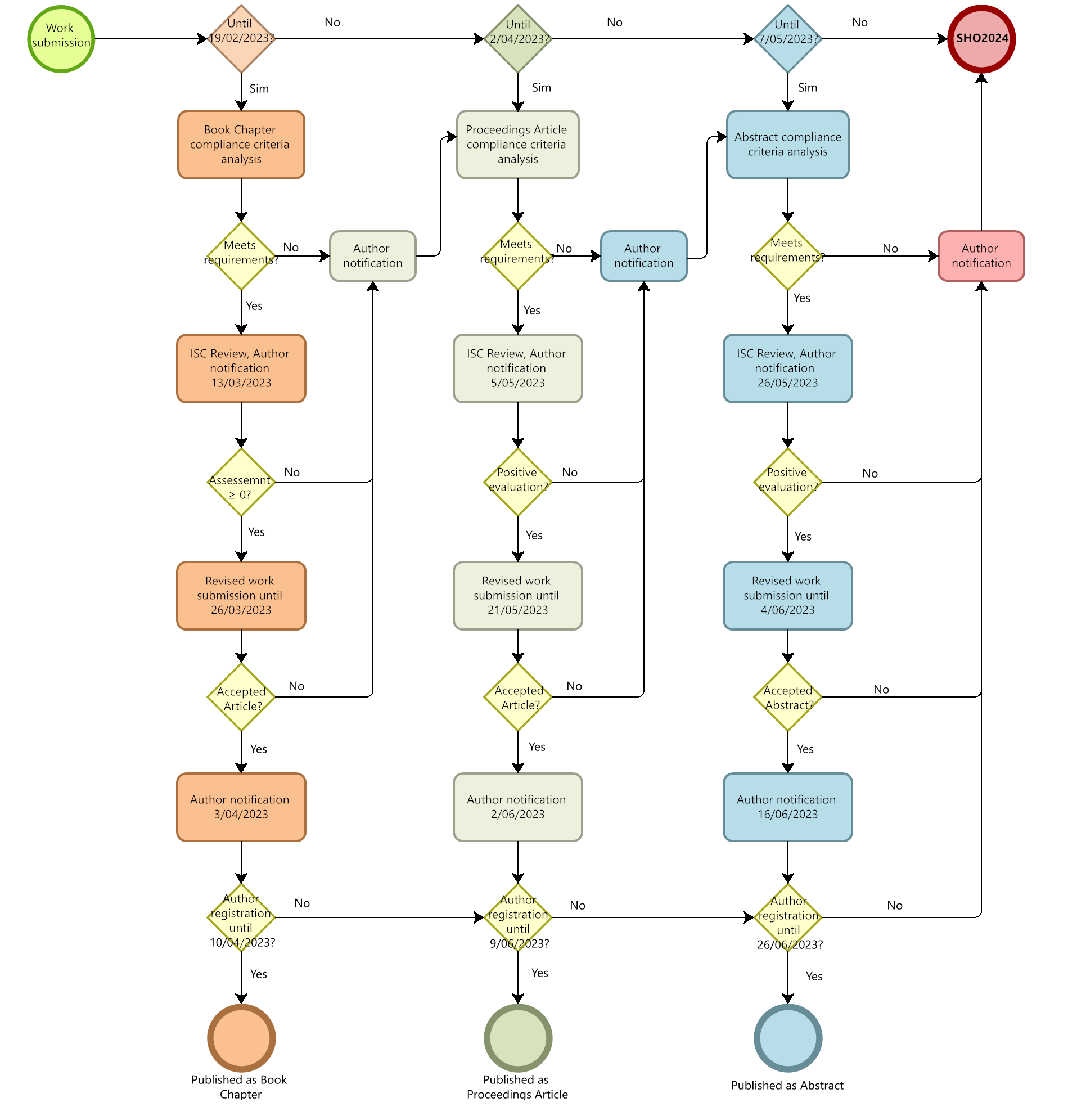
Manuscript submission
Instructions for authors
Click to download
Submissions must comply with the deadline calendar
Due to commitment to the Publishers, failure to meet deadlines (submission or resubmission of works) makes its acceptance and publication unfeasible, and articles will be disregarded in their original category. They can, however, be considered for publication in the category that best suits them (according to the timeline). If the author does not intend to change the work’s category, it will be automatically considered for the 2024 event edition.
Submissions must be electronic
Submissions will be made via EquinOCS platform.
Registration is free, but mandatory.
Do not know how to submit your work? Click here
AWARDS
AWARDS
List of Winners
Best Book Chapter Award
1st place – Occupational and individual factors for musculoskeletal pain in the automotive industry (Assunção et al.)
2nd place – Modelling physical fatigue through physiological monitoring within high-risk professions (Bustos et al.)
3rd place – Indoor air quality in fitness centers with/without the restrictions of COVID-19 (Peixoto et al.)
Honorable mentions
Towards an integrated approach on Occupational Health to tackle COVID19 pandemic (Ribeiro et al.)
A look at the relationship between fatigue and self-employed truck drivers (Soliani et al.)
Comparison between anthropometric equipment and scanners in hand measurement (Anacleto Filho et al.)
Cardiorespiratory symptoms and disease among firefighters (Barros et al.)
Decision-Making Styles as Human Factors in Occupational Context (Efremov et al.)
Digital twin applications in the extractive industry – a short review (Duarte & Baptista)
Development and implementation of a management model of ergonomic conditions supported by autonomous teams (Fernandes et al.)
Lumbar postural responses during gaming activity: A study with semi-professional and amateur gamers (Gonçalves et al.)
Cardiopulmonary, metabolic and perceived exertion characteristics of Portuguese firefighters (Bustos et al.)
Visual fatigue from occupational environment: a review study (Ferreira et al.)
Best Paper Award
1st place – An Analysis for the evaluation of Productivity in Human-Robot Collaboration (Caiazzo et al.)
2nd place – Avaliação de potenciais de resiliência num município português: a segurança e saúde do trabalho nos jardineiros (Mendes & Melo)
3rd place – Ansiedade face à morte e clima de segurança física como preditores da paixão pelo trabalho: O efeito da perceção de risco (Sousa et al.)
Honorable mentions
Ergonomic Analysis of the Supply of a Logistics Train (Vale et al.)
Relação conceitual entre ergonomia e qualidade de vida no trabalho: a humanização do trabalho sob a ótica da análise ergonómica (Prachum)
Saúde e adoecimento do trabalhador operador de caixa de supermercado: análise reflexiva à luz teórica de Betty Neuman (Costa et al.)
Best Abstract Award
1st place – Environmental intervention program for modern Portuguese offices – Study design and preliminary IEQ assessments (Felgueiras et al.)
2nd place – NOx and nanoparticles levels in undergrounds car parks (Garcia-Gonzalez)
3rd place – The concept of low back pain: a systematic review (Carretas)
Best Presentation Award
Ergo4workers: Usability Testing of the Second Prototype of an App for the Ergonomic Assessment of Healthcare Professionals (Sabino et al.)
WORK PRESENTATION
WORK PRESENTATION
The inclusion of accepted manuscripts in the Symposium publications presupposes that the authors commit themselves to make their respective presentations at the event. In the case that they do not do so, and do not provide a plain justification for their absence, they will be prevented from publishing in subsequent editions of the event.
GENERAL INSTRUCTIONS FOR PRESENTATIONS
Presentations should be between 10-12 minutes, leaving a window of 3-5 minutes open for discussion.
Virtual presentations: all virtual presentations must be sent to sho2023@sposho.pt prior to the symposium, according to the instructions provided by email. On the day of the presentation, authors must log in, at least, 15 minutes prior to the session beginning. There will be a period for Q&A at the end of each presentation. Therefore, the presenting author must be available to address any questions.
Room presentations: presentations must be sent to sho2023@sposho.pt prior to the symposium, according to the instructions provided by email. Presenting authors must check in 10 minutes before the session starts to receive general instructions from the Chairman.
GENERAL INSTRUCTIONS FOR POSTERS
Please use the template available here.
Posters must be delivered to the task force at the registration on the first day of the symposium.
During the poster sessions, authors should be available to discuss their work.
PROGRAM
PROGRAM
During the two days of Symposium, participants with valid (paid) registration will have free access to technical-scientific training, plenary sessions and parallel sessions of the published works.
With due notice, the program of the event will be made available here.
VENUE
VENUE
The Symposium will be held at the Faculty of Sports of the University of Porto.
How to get to OPorto/Faculty of Sports of the University of Porto? The nearest airport is OPorto airport, “Francisco Sá Carneiro Airport” (~ 15 km). You can take the trip from the airport to the city centre using a shuttle (for more information, you can visit this link). Alternatively, you can take a taxi (~ 15 km), or a cheaper option is to go by metro, using the “Metro do Porto” (www.metrodoporto.pt). By car and using a navigation system, the Faculty of Sports of the University of Porto can be identified through the following address: Rua Dr Plácido da Costa n.º91, 4200-450 Porto, Portugal.
COMMITTEES
COMMITTEES
Honorary Chairman
A. Sérgio Miguel, University of Minho & University of Porto, Portugal
Chairman
João Santos Baptista, University of Porto
Secretary
Rui Melo, University of Lisbon
Organizing Committee
Pedro Arezes, University of Minho, Portugal
Ana Colim, University of Minho, Portugal
Gonçalo Perestrelo, University of Porto, Portugal
Jacqueline Castelo Branco, University of Porto, Portugal
Joana Guedes, University of Porto, Portugal
Mónica Barroso, University of Minho, Portugal
Nélson Costa, University of Minho, Portugal
Paula Carneiro, University of Minho, Portugal
Susana Costa, University of Minho, Portugal
Local Organizing Committee
J. Duarte, University of Porto, Portugal
J. Torres Costa, University of Porto, Portugal
Mário Vaz, University of Porto, Portugal
International Scientific Committee
A. Sérgio Miguel | University of Minho & University of Porto, Portugal
A. Virgílio Monteiro de Oliveira | Department of Mechanical Engineering, Polytechnic Institute of Coimbra ISEC, Portugal
Alberto Villarroya López | A Coruña University, Spain
Alfredo Soeiro | Faculty of Engineering, University of Porto, Portugal
Ana C. Meira Castro | School of Engineering, Polytechnic of Porto, Portugal
Ana Colim | University of Minho, Portugal
Ana Ferreira | Polytechnic Institute of Coimbra, Portugal
Angélica S. G. Acioly | Federal University of Paraíba, Brazil
Anil R. Kumar | San Jose State University, United States of America
Anna Sophia Piacenza Moraes | Federal University of Triangulo Mineiro, Brazil
Antonio López Arquillos | Polytechnic University of Madrid & University of Castela-Mancha, Spain
Antonio José Carpio de Los Pinos | Higher Technical School of Building & School of Industrial and Aerospace Engineering of Toledo, Spain
António Oliveira e Sousa | Institute of Engineering, University of Algarve, Portugal
Beata Mrugalska | Poznan University of Technology, Poland
Bianca Vasconcelos | University of Pernambuco, Brazil
Camilo Valverde | Católica Porto Business School, Portugal
Carla Barros | Fernando Pessoa University, Portugal
Carla Viegas | Lisbon School of Health and Technology, Portugal
Catarina Silva | Laboratory of Ergonomics, Faculty of Human Kinetics, University of Lisbon, Portugal
Cristina Reis | University of Trás-os-Montes and Alto Douro, Portugal
Delfina Ramos | School of Engineering, Polytechnic of Porto, Portugal
Denise Soares | American University of the Middle East, Kuwait
Eliane Maria Gorga Lago | University of Pernambuco, Brazil
Ema Sacadura-Leite | NOVA National School of Public Health, NOVA University, Portugal & Faculty of Medicine, University of Lisbon, Portugal
Emília Duarte | IADE – European University, Portugal
Emilia R. Kohlman Rabbani | University of Pernambuco, Brazil
Fernanda Rodrigues | University of Aveiro, Portugal
Fernando Gonçalves Amaral | Federal University of Rio Grande do Sul, Brazil
Filipa Carvalho | Laboratory of Ergonomics, Faculty of Human Kinetics, University of Lisbon, Portugal
Filomena Carnide | Faculty of Human Kinetics, University of Lisbon, Portugal
Florentino Serranheira | NOVA National School of Public Health, NOVA University, Portugal
Francisco Fraga López | University of Santiago de Compostela, Spain
Francisco Rebelo | ergoUX Lab, Faculty of Architecture, University of Lisbon, Portugal
Francisco Silva | Centro Tecnológico da Cerâmica e do Vidro (CTCV), Portugal
Gustavo Adolfo Rosal López | PrevenControl, Spain
Gyula Szabo | University of Óbuda, Budapeste
Hélder Simões | Polytechnic Institute of Coimbra, Portugal
Hernâni Veloso Neto | RICOT, University of Porto, Portugal
Ignacio Pavón | Technical University of Madrid, Spain
Isabel Nunes | NOVA School of Science and Technology, NOVA University, Portugal
Jacqueline Castelo Branco | Faculty of Engineering, University of Porto, Portugal
Jesús A. Carrillo-Castrillo | University of Seville, Spain
Joana C. Santos | School of Health, Polytechnic Institute of Porto, Portugal
Joana Duarte | Faculty of Engineering, University of Porto, Portugal
Joana Guedes | Faculty of Engineering, University of Porto, Portugal
João Paulo Vilas-Boas | Faculty of Sports, University of Porto, Portugal
João Santos Baptista | Faculty of Engineering, University of Porto, Portugal
João Ventura | Center for Innovation, Technology and Policy Research, IST Lisbon, Portugal
José Campos | Faculty of Dental Medicine, University of Porto, Portugal
José Carvalhais | Ergonomics Laboratory, Faculty of Human Kinetics, University of Lisbon, Portugal
José Domingues | University of Minho, Portugal
José Torres Costa | Faculty of Medicine, University of Porto, Portugal
Juan Carlos Rubio-Romero | University of Málaga, Spain
Laura Martins | Federal University of Pernambuco, Brazil
Liliana Cunha | Faculty of Psychology and Educational Sciences, University of Porto, Portugal
Lúcia Santos | Faculty of Engineering, University of Porto, Portugal
Luiz Silva | Federal University of Paraíba, Brazil
Manuel Azenha | Faculty of Sciences, University of Porto, Portugal
Manuela Silva | School of Health, Polytechnic Institute of Porto, Portugal
Maria Antónia Carravilla | Faculty of Engineering, University of Porto, Portugal
Maria Antónia Gonçalves | School of Engineering, Polytechnic of Porto, Portugal
María de las Nieves González García | Polytechnic University of Madrid, Spain
Maria del Carmen Pardo Ferreira | University of Málaga, Spain
Maria del Carmen Rey-Merchán | University of Málaga, Spain
Maria Dolores Martínez-Aires | University of Granada, Spain
Maria José Abreu | University of Minho, Portugal
Maria Luísa Matos | Faculty of Engineering, University of Porto, Portugal
Marino Menozzi | Human Factors Engineering, ETH Zurich, Switzerland
Mário Vaz | Faculty of Engineering, University of Porto, Portugal
Marta Santos | Faculty of Psychology and Educational Sciences, University of Porto, Portugal
Martin Lavallière | University of Québec, Canada
Martina Kelly | University of Galway, Ireland
Matilde Rodrigues | School of Health, Polytechnic Institute of Porto, Portugal
Maurília de Almeida Bastos | Federal Institute of Santa Catarina, Brazil
Mónica Barroso | University of Minho, Portugal
Mónica Dias Teixeira | REQUIMTE, Portugal
Nélson Costa | University of Minho, Portugal
Nelson Rodrigues | University of Minho, Portugal
Paul Swuste | Safety Science and Security Group TU Delft, The Netherlands
Paula Carneiro | University of Minho, Portugal
Paulo Carvalho | Nuclear and Energy Research Institute, Brazil
Paulo Oliveira | Polytechnic Institute of Porto, Portugal
Paulo Sampaio | University of Minho, Portugal
Pedro Arezes | University of Minho, Portugal
Pedro Ferreira | Centre for Marine Technology and Ocean Engineering, Portugal
Pere Sanz-Gallén | University of Barcelona, Spain
Rachel Nugent | Atlantic Technological University, Ireland
Rui Azevedo | University of Maia, Portugal
Rui B. Melo | Ergonomics Laboratory, Faculty of Human Kinetics, University of Lisbon, Portugal
Rui Garganta | Faculty of Sports, University of Porto, Portugal
Rui Fernandes Póvoas | Faculty of Architecture, University of Porto, Portugal
Sara Ferreira | Faculty of Engineering, University of Porto, Portugal
Srdjan Glisovic | Faculty of Occupational Safety, University of Niš, Serbia
Susana Casal | Faculty of Pharmacy, University of Porto, Portugal
Susana Costa | University of Minho, Portugal
Susana P. B. Sousa | Institute of Science and Innovation in Mechanical and Industrial Engineering (INEGI), Portugal
Susana Paixão | Polytechnic Institute of Coimbra, Portugal
Tânia Miranda Lima | University of Beira Interior, Portugal
Teerayut Sa-ngiamsak | Burapha University, Thailand
Teresa Cotrim | University of Lisbon, Portugal
Tomi Zlatar | Atlantic Technological University, Ireland
Waldemar Karwowski | University of Central Florida, United States of America
Task force
Denisse Bustos | Faculty of Engineering, University of Porto
Felicidade Noémia Xerinda Niquice | Faculty of Engineering, University of Porto
Hossein Charkhand | Faculty of Engineering, University of Porto
Marcelo Montebello Silva | Faculty of Engineering, University of Porto
Maria Fernandes | Faculty of Engineering, University of Porto
Pedro Miguel Bilro Carretas | Faculty of Engineering, University of Porto
Radigande Guiomar Gomes da Silva | Faculty of Engineering, University of Porto
Seyed Iliya Pezeshki | Faculty of Engineering, University of Porto
Tatiana Teixeira | Faculty of Engineering, University of Porto
CONTACT INFORMATION
CONTACT INFORMATION

SOCIAL NETWORKS
SOCIAL NETWORKS

